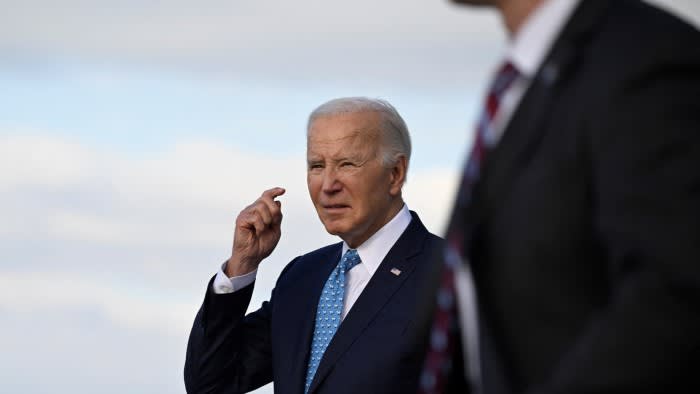Unlock the Editor’s Digest for free
Roula Khalaf, Editor of the FT, selects her favourite stories in this weekly newsletter.
The US carried out strikes in Iraq and Syria on Friday, hitting targets that included elements of Iran’s Islamic Revolutionary Guard Corps, in retaliation for a drone attack killed three American troops based in Jordan.
The Pentagon’s Central Command said 85 targets were hit, including those associated with the IRGC’s Quds Force as well as Iranian-backed militia in the region. It is the first of what the Pentagon has said will be a series of retaliatory strikes.
It marks the first time the US has targeted the Quds Force directly in its escalating campaign in the region, and will heighten fears Washington is being drawn deeper into a widening regional conflict sparked by the Israel-Hamas war.
The IRGC is an Iranian military force tasked with defending the regime in Tehran and is separate from Iran’s conventional military. Its Quds Force, which operates outside Iran, carries out covert attacks as part of Iran’s efforts to project power in the Middle East, assert its leadership of Shia Muslims in the region, and deter enemies like the US and Israel.
Central Command said the air strikes were carried out by planes that included “long-range bombers flown from the United States”. All told, they fired more than 125 precision munitions and hit facilities including command and control and intelligence centres; rocket, missile and drone storage sites; and logistic hubs, Centcom said.
President Joe Biden has sought to avoid escalation despite repeated attacks by Iran-backed militias on US military personnel in Iraq, Syria and Jordan. The US last month also launched a campaign of missile strikes against Iran-backed Houthi rebels in Yemen, who have been attacking commercial shipping in the Red Sea.
“We will have a multi-tiered response, and again, we have the ability to respond a number of times, depending on what the situation is,” Lloyd Austin, the US defence secretary, said on Thursday.
Washington attributed last Sunday’s drone attack on its base in Jordan, which also injured 41 service members, to the Islamic Resistance in Iraq — a shadowy umbrella group that contains Kataib Hizbollah, a radical Shia militia, as well as other groups that have claimed responsibility for more than 160 attacks against US service members since mid-October, after the start of the Israel-Hamas war.
The IRI is part of the Axis of Resistance, controlled by Iran, and has also targeted Israeli interests since Hamas’s attack on the Jewish state in October.
Biden has been under pressure from some Republicans to hit Iran directly in response to last week’s attacks, which follow months of strikes by Houthi rebels on commercial vessels in the Red Sea, an important shipping lane for global trade.
The bodies of the three US army reservists arrived at Dover Air Force base just hours before the air strikes began. The president and his wife Jill Biden attended the arrival ceremony on Friday afternoon.
Biden is not seeking a “wider war in the Middle East. That’s not what I’m looking for,” he told reporters on Tuesday. Iranian officials have also said they do not seek direct conflict with the US and Israel, or a regional war. “We are not seeking war, but we are not afraid of it,” Major General Hossein Salami, commander of the IRGC, said on Wednesday.
Biden’s decision to attack came after several meetings in recent days with his national security team to decide on an appropriate response. In the meantime, Kataib Hizbollah on Wednesday said it had halted attacks on US troops.
The US said it did not take that claim at “face value” and said Kataib Hizbollah was not the only group attacking its troops.
